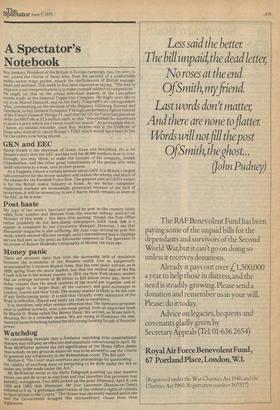A Spectator's Notebook
Roy Jenkins, President of the Britain in Europe campaign, has, I'm sorry to see, joined the chorus of those who, from the security of a comfortable Public-sector wage packet, attack the inefficiencies of British management and workers. This week he has been reported as saying, "The way to Improve your competitiveness is to make yourself subject to competition." He might try that on the colour television makers, or the Lancashire textile trade, or the Imperial Typewriter Company. He might even like to try it on Marcel Dassault, and on the Daily Telegraph's air correspondent who, commenting on the decision of the Belgians, following Norway and Denmark, to buy General Dynamics' F16 high-performance fighter instead of the French Dassault Mirage F1, said that the US Air Force had placed an order for 650 Figs at £2.5 million each, so that "this enabled the Americans to quote a price which the French could not match." As an example this is, I know, an unkind reminder, since Roy Jenkins was in the forefront of those who wanted to cancel Britain's TSR2 which would have been in line for the orders now being placed.
GKN and EEC
Barrie Heath is the chairman of Guest, Keen and Nettlefold. He is for Britain's entry into the EEC and has told his 80,000 workers how to vote. Enough, you may think, to make the founder of his company, Joseph Chamberlain, and the other great industrialists of the period who were tariff reformers to a man, turn in their graves.
As it happens, I know a certain amount about GKN. It is Britain's largest sub-contractor for the motor industry and makes the wheels and much of the chassis for the Swedish Volvo firm. The greatest part of GKN's output is for the British motor industry at home. As our motor companies' traditional markets are increasingly penetrated because of the lack of protection, it will be interesting to see if Barrie Heath remains as keen on the EEC as he is now.
Post haste
My copy of last week's Spectator arrived by post in the country (sixty miles from London and thirteen from the nearest railway station) on Monday of this week — five days after posting, though the Post Office rather piudently do not date-stamp newspapers. Each week this is a matter of complaint by our Circulation Manager. However, I see that Encounter magazine is also suffering. My June copy arrived by post this week, which seemed efficient enough, until I remembered that a clippings service had sent us (by post) an Encounter reference to The Spectator in its review of Robert Skidelsky's biography of Mosley ten days ago.
Money panic
There are ominous signs that with the increasing lack of insulation between the economies of the Western world, now so dangerously accentuated by Common Market rules, that the next panic will not, as in 1929, spring from the stock market, but that the central axis of the Big Crash will be in the money market. In 1974, the New York money market had an average turnover of $8 billion to $10 billion every day, more in dollar volume than the stock markets of the world put together, and at times equal to, or larger than, all the currency and gold exchanges in London, Zurich and New York. The money market is likely to be the core of any forthcoming panic. It is said that virtually every institution of the West is inflexible, illiquid and many are close to insolvency. It is, therefore, only after serious reflection that The Spectator proposes soon to publish extracts, over a six-week period, from an important book by Martin D. Weiss called The Money Panic. We are not, as Weiss puts it, shouting fire in a crowded cinema. We are trying to illuminate the real, Material hazards lurking behind the still strong-looking facade of financial Power.
Watchdog An outstanding example that a freelance watchdog over constitutional matters may still play an effective and important role occurred in April. Mr Ross McWhirter spotted the full significance of the Home Office desire that nobody on any grounds whatever was to be allowed to use the Courts to question any irregularity in the Referendum count. The Bill said: Section 4: "No Court shall entertain any proceedings for questioning ... the validity of anything done or purporting to be done under the Act or Under any order made under the Act." Mr McWhirter wrote to the Daily Telegraph pointing out that massive errors can and do occur at elections and that therefore this provision was Patently outrageous. Two MPs picked up the point (Hansard; April 9; cols 1454 and 1503) that afternoon. Mr Ivor Lawrence (Burton-on-Trent) referred to it as "a grotesque deprivation of the ordinary rights of citizens to have access to the Courts." The House was obviously nettled and in the end the Government dropped this extraordinary clause from their legislation.


































 Previous page
Previous page